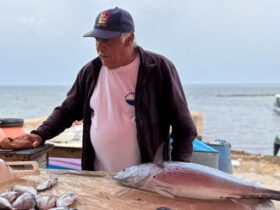Expectations of success are increasing. Mazloum Abedi, commander of Syrian Kurdish forces in the north of Syria, recently announced that, in principle, an agreement had been reached with the Syrian central government on a “mechanism” to integrate Syrian Kurdish forces into the Syrian National Army. It’s been a long time coming: An agreement between the two parties, signed earlier this year, remains on hold.
Ilham Ahmed, a foreign affairs official for the Kurdish-run Autonomous Administration of Northern and Eastern Syria, or AANES, also confirmed that talks were taking place between AANES and Turkey on reopening the border crossing. He also talked about a positive preliminary agreement.
border crossings closed
The border between Türkiye and Syria is approximately 911 kilometers (566 mi) long. For both countries, this is their longest border. During the Syrian Civil War, Turkey kept only a few border crossings open there, and only to a limited extent. The crossing was controlled by various armed groups on the Syrian side and this control occasionally changed hands. The three crossings are in the Kurdish-administered region of AANES in north-eastern Syria.
Political and economic relations between Syria and Turkey have significantly improved since the fall of Syrian dictator Bashar Assad’s regime in December 2024. Syria’s de facto president, Ahmed al-Sharaa, is the former leader of a militia Ankara supported in the civil war.
Türkiye sees itself as an important political player in Syria and is also keen to benefit economically from the new situation. However, for this to happen, much greater political stability is needed in Syria. Currently, the new government does not have full control of security in the country and there have been inter-communal clashes as well as extrajudicial killings.
rapprochement with the kurds
It is estimated that the Syrian Kurds control one quarter to one third of Syrian territory. About half of the shared land border with Türkiye passes through Kurdish-controlled areas.
After more than 13 years of war, the rapprochement currently taking place between Damascus and the Kurds – reportedly with pressure from the US – is giving hope to Turkish entrepreneurs doing business with their Kurdish neighbours.
So far, three border crossings into Kurdish-controlled areas are closed. Turkey says this is due to security reasons. If they are reopened, as others already have, Turkish businesses expect exports to Syria to immediately double, from $2 billion (€1.7 billion) to $4 billion (€3.5 billion).
Türkiye’s conditions for opening border crossings
However Ankara has made it clear that the border crossings will be opened only on one condition: they must be controlled by the Syrian National Army and not, as they currently are, by AANES troops.
The AANES region is rich in oil and raw materials, and is governed by the Democratic Union Party (PYD), which reportedly maintains close ties with the banned Kurdistan Workers’ Party (PKK).
The PKK is classified as a terrorist organization by Germany, Türkiye and other countries. However earlier this year, the PKK formally announced its disbandment and disarmament. Since 2016, the Turkish military has repeatedly bombed Kurdish-controlled areas, including Syria, to try to attack the PKK. Turkey has also deployed troops to some Syrian cities, including Afrin, Jarablus and Azaz.
driver of economic growth
Sahismail Bedirhanoglu, head of Turkey’s Southeastern Industrialists and Businessmen Association, reports that Turkish exports to Syria have increased by 50% since the fall of the Assad regime.
“If Damascus and the Kurds also reach an agreement, we hope that other border crossings will open and trade between us will increase,” Bedirhanoglu says.
Businessmen recall that, for years, Ankara was also critical of the semi-autonomous region of Iraqi Kurdistan, which is controlled by Iraqi Kurdish politicians – until it started doing business with it 20 years ago. Today, Türkiye’s annual exports to Iraq amount to $13 billion and 80% of it goes to the Iraqi Kurdish regions. “We are hoping that things will be similar with Syria,” says Bedirhanoglu.
Turkish companies eager to help rebuild
Ahmet Fikret Kilesi, coordinator of the Southeastern Anatolian Exporters Association, is also optimistic. He says that after more than 13 years, new land and sea transport routes have opened in recent months. “Based on our past experience, we can expect the movement of goods to grow very quickly,” Kilesi says.
Kilesi explains that Turkish companies are now exporting to many parts of Syria. “The reconstruction of Syria offers many opportunities,” he says. “We can supply the materials the construction industry needs, from chemical elements to cement, steel and ceramics.” [to] “Generators and Energy Systems.”
Mehmet Kaya, head of the Chamber of Commerce and Industry of the Kurdish-dominated city of Diyarbakir, believes there is demand in practically every sector. “Once we reach an agreement with the Syrian Kurds, we can export a wide variety of products, from food and household appliances to textiles and furniture,” he says.
race to defeat china
Kaya urgently wants trade relations to be expanded to the whole of Syria. They are worried that if Ankara does not act soon, China could capture Syria’s large market. He says Chinese companies are already entering the Syrian and Iraqi markets through the Gulf countries and rapidly increasing their market share.
In his view, Ankara should not only establish closer ties with Damascus, but also take into account the wishes and needs of other minorities in Syria. Otherwise, Kaya believes, both the region and the Turkish economy will suffer.
They believe that, in particular, the border crossing between the Turkish cities of Nusaybin and Qamishli on the Syrian-Kurdish side could become the most important gateway for trade in the region, provided that it opens soon.
Although the Turkish government still does not trust the AANES government in northern Syria, it believes it will not easily give up control there. Additionally, Turkish government-linked newspapers report that Damascus has requested military training and equipment from Ankara, raising suspicions about the Syrian Kurds.
This article has been translated from German.






Leave a Reply